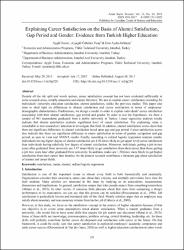| dc.contributor.author | Turan, A. | en_US |
| dc.contributor.author | Tunç, A.Ö. | en_US |
| dc.contributor.author | Göktepe Aydın, Esra | en_US |
| dc.date.accessioned | 2019-10-29T17:48:55Z | |
| dc.date.available | 2019-10-29T17:48:55Z | |
| dc.date.issued | 2015 | |
| dc.identifier.issn | 1911-2017 | |
| dc.identifier.uri | https://dx.doi.org/10.5539/ass.v11n24p229 | |
| dc.identifier.uri | https://hdl.handle.net/20.500.12294/2021 | |
| dc.description | Göktepe Aydın, Esra (Arel Author) | en_US |
| dc.description.abstract | Despite all the ink split and words spoken, career satisfaction concept has not been evaluated sufficiently in some research areas, notably education and alumni literature. We aim to explain career satisfaction extending for individuals’ university education satisfaction, alumni satisfaction, unlike the previous studies. This paper also aims to shed light on differences in alumni satisfaction and career satisfaction in terms of employees’ demographic characteristics. Furthermore, we design a model in order to explain individuals’ career satisfaction associating with their alumni satisfaction, gap period and gender. In order to test the hypotheses, we draw a sample of 963 respondents graduated from a public university in Turkey. Linear regression analysis results indicate that alumni satisfaction explains significant level of career satisfaction. The explaining value is remarkable to turn researchers’ attention to investigate this field. In addition, alumni satisfaction scores show that there are significant differences in alumni satisfaction based upon age and gap period. Career satisfaction scores also indicate that there are significant difference in career satisfaction in terms of gender, occupation and gap period, as seen in t-test and ANOVA results. Finally, according to ordinal logistic regression analysis results, individuals having higher degree of alumni satisfaction are 4.56 times likely to get upper level career satisfaction than individuals having relatively low degree of alumni satisfaction. Moreover, individuals getting a job in two years after graduated from university are 3.97 times likely to get satisfaction from their career than those getting a job two years later after graduated from university. In addition, males are 1.74 times more likely to get higher satisfaction from their career than females. So the present research contributes a literature gap about satisfaction of alumni and career fields. © 2015, Canadian Center of Science and Education. All rights reserved. | en_US |
| dc.language.iso | eng | en_US |
| dc.publisher | Canadian Center of Science and Education | en_US |
| dc.relation.ispartof | Asian Social Science | en_US |
| dc.identifier.doi | 10.5539/ass.v11n24p229 | en_US |
| dc.identifier.doi | 10.5539/ass.v11n24p229 | |
| dc.rights | info:eu-repo/semantics/openAccess | en_US |
| dc.subject | Alumni | en_US |
| dc.subject | Career | en_US |
| dc.subject | Ordinal logistic regression | en_US |
| dc.subject | Satisfaction | en_US |
| dc.title | Explaining career satisfaction on the basis of alumni satisfaction, gap period and gender: Evidence from Turkish higher education | en_US |
| dc.type | article | en_US |
| dc.department | İstanbul Arel Üniversitesi, İktisadi ve İdari Bilimler Fakültesi, İşletme Bölümü | en_US |
| dc.identifier.volume | 11 | en_US |
| dc.identifier.issue | 24 | en_US |
| dc.identifier.startpage | 229 | en_US |
| dc.identifier.endpage | 239 | en_US |
| dc.relation.publicationcategory | Makale - Uluslararası Hakemli Dergi - Kurum Öğretim Elemanı | en_US |
| dc.department-temp | Turan, A., Yildiz Technical University, Istanbul, Turkey; Tunç, A.Ö., Department of Business Administration, Istanbul University, Istanbul, Turkey; Göktepe, E.A., Department of Business Administration, Istanbul Arel University, Istanbul, Turkey | en_US |


















